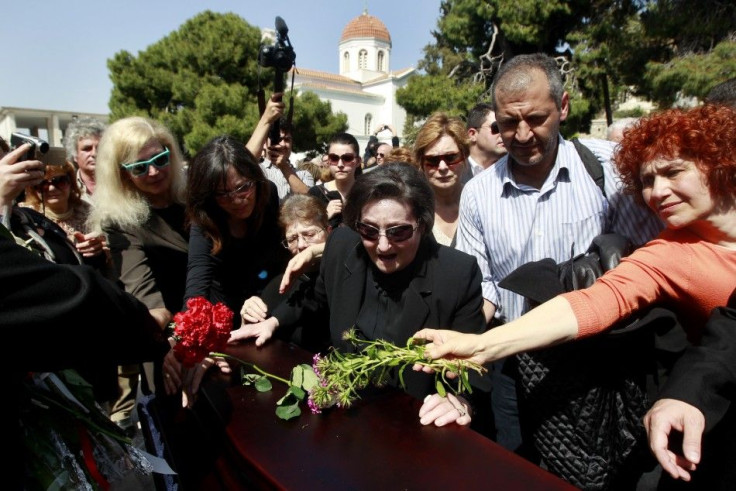Greece: Economic Crisis Sparks Surge In Suicides

The deeply-entrenched economic crisis in Greece has pushed up the rates of depression and suicide, as a beleaguered public copes with a chasm of debt and deprivation that may last for decades.
According to data that will be delivered at the 38th annual Panhellenic Medical Congress conference this week in Athens, suicides jumped by more than 22 percent during the 2009-2011 period, exacerbated by Greece’s severe economic problems, including thousands of vanished jobs and a national unemployment rate well above 20 percent.
Greek police statistics showed that 1,727 people in the country committed suicide during that two-year period.
Eleftherios Lykouras, the chief of the Attikon Hospital’s Psychiatric Department, told Greek media at a press conference, that the surge in people killing themselves can be directly linked to “increased insecurity and uncertainty for the future.”
Moreover, the number of people seeking professional help for their personal problems has jumped by up to 30 percent according to the Athens-Macedonian News Agency (AMNA).
Lykouras also said that children, including even pre-schoolers, have been emotionally affected by the economic crisis, with rising numbers of youngsters seeking psychiatric care. Many such children have been taken to hospitals complaining of “intense headaches and stomach pains and pains in their extremities, with the diagnosis resulting from test results indicating a psychological, stress-related factor.”
Greek media has daily reported on the human costs of the ongoing economic catastrophe, including rising crime, broken families, parents abandoning their children, as well as incidents of suicide.
One of the most spectacular acts of self-murder occurred in early April when Dimitris Christoulas, a retired pharmacist, publicly shot himself in the head in busy Syntagma square in central Athens across from parliament building, in despair over his poverty.
There have also been numerous reports of people hanging themselves from lampposts, people jumping off balconies, among other public acts of suicide.
Prior to killing himself, Christoulas wrote a suicide note in which he lamented: I see no other solution than this dignified end to my life so I don't find myself fishing through garbage cans for sustenance.”
He also called for Greek youths to rebel against their government.
“I believe that the youth who have no future will one day take up arms, and in Syntagma Square will hang the national traitors upside down, as the Italians did to [Benito] Mussolini in 1945,” he wrote.
“I am not committing suicide, they are killing me.”
Christoulas’ daughter Emy, 43, told Greek media: My father's handwritten note leaves no room for misinterpretation. His whole life was spent as a leftist fighter, a selfless visionary. This final act was a conscious political act, entirely consistent with what he believed and did in his life.
Dimitris Dikaios, an Athens University associate professor of psychiatry, told the Athens News: “When you have an epidemic, like an economic depression, it is natural that suicide rates will go up. Moreover, when you have suicides that are done in a spectacular way, as happened in Syntagma, it is possible to have a snowball effect.”
Dikaios also referred to historic precedents for such public (and symbolic) acts of suicide.
“The Buddhist monks who immolated themselves in the 1960s were committing a political suicide,” he said.
“In Prague, in 1968, a university student set himself on fire when the Russian tanks came in. That was obviously a political suicide. So was that of a Greek university student who immolated himself in Italy to protest the Greek junta.”
He added: “When you commit suicide on Syntagma, is it not to say to the MPs in parliament that ‘I am committing suicide because you harmed me’? Thus, it takes on a political character.”
Indeed, the crisis appears to have scarred the national psyche.
Nikos Sideris, a Greek psychoanalyst, told Reuters: The crisis has triggered a growing sense of guilt, a loss of self-esteem and humiliation for many Greeks.”
Sideris added: Greek people don't want to be a burden to anyone and there's this growing sense of helplessness. Some develop an attitude of self-hatred and that leads to self-destruction. That's what's behind the increase in suicide and attempted suicide.”
However, the suicide rate in Greece has been historically low, especially compared to nations like Hungary and Russia, where rates have been high.
The Greek health ministry noted that just prior to the outbreak of the debt crisis, the country’s suicide rate amounted to 2.8 per 100,000 people, one of the lowest figures in the world. (In contrast, the suicide rate in Lithuania is on the order of 42 per 100,000 inhabitants).
However, by the first half of 2010, the incidence of suicide in Greece jumped by 40 percent.
The actual number of suicides may be much higher since some Greeks, fearing for their family’s image, may disguise their planned deaths as “accidents.” Moreover, there is a stigma attached to suicide since the Greek Orthodox Church will not officiate a burial for suicide victims.
Nikos Mouzelis, a London School of Economics sociology professor emeritus, told the Athens News that Greek youth (half of whom are jobless) are at particular risk.
“The youth, many of whom are supported by their parents, find themselves in a desperate situation. A profession defines an individual to a large extent, and being unemployed is a stigma in our society,” he said.
“The first thing we ask when we want to know who someone is, is ‘What is your profession?’ If someone has no job, there is total humiliation. That creates anxiety which is difficult to handle, and many resort to drugs or suicide.”
© Copyright IBTimes 2025. All rights reserved.





















